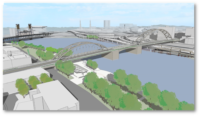Thus, provisions were already in place to handle the unexpected. "TriMet had pre-addressed a lot of things and had the money set aside," Zink says. "It can be a heck of a lot of work to try to get any money, but TriMet could be very nimble at making decisions moving forward."
"In hindsight, it was a win-win for the project," Zink says. "I think TriMet better understood the risk because of the process they had gone through, and we gained a lot of trust with one another. I've had other clients since then that I wish would listen more to TriMet about the whole approach to dealing with contractors."
Early Dialogue
Blocher says the early dialogue pointed out risks the project team simply wasn't aware of and gave TriMet a broader understanding on potential strategies for building the bridge. He says it also helped contractors to bid on the job.
"It really set the stage for exceptional collaboration between owner and collaborator," he says. "It helped earn trust with one another and not fall into a very classic us-versus-them thinking that, ultimately, leads to a large number of claims."
All the effort paid off when it came to the site conditions. The parties worked together to solve the problem, already knowing how much money it would cost to settle the issue-instead of "immediately digging in and documenting with letters and emails," observes Blocher. "It allowed direct problem-solving without regard for project timing or extended overhead."
"It gets to a solution quicker," Zink adds. "You focus on something different than placing blame."






